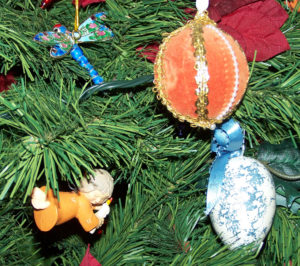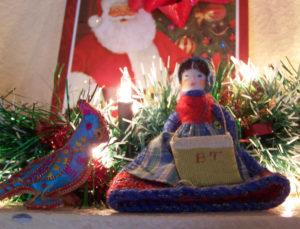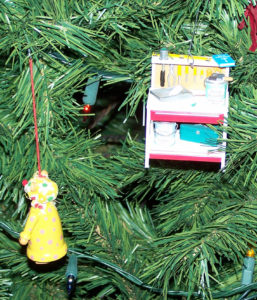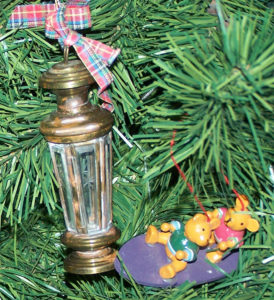Honestly, I just meant to get a screwdriver from the toolbox in the garage, and go about my soon-to-be-renovated bathroom, taking down the glass shelf, the towel hook and the little glass vases in nickel-finished holders – all the hardware that I am going to reuse because I liked it very much, and they were pretty expensive when I first purchased them from Crate and Barrel when I did some superficial redecorating of the master bathroom shortly after moving in.
But I found the putty knife when I was going through the toolbox (which I will need to scrape that disgusting popcorn texture off the ceiling) and the big hammer … I am going to be using all of them in the next few days anyway. Yes, I walked into the bathroom with the hammer and began bashing away at the tile surround, just to see how difficult it would be. What with one thing and another, about a third of the nasty stuff is removed. This is featureless white contractor-grade tile of no particular merit, with the grout between permanently grotty and incapable of ever being thoroughly clean … well, I just got carried away, mostly with how much I hate that nasty cheap bathtub and shower surround in the master bathroom. It turns out that although water had seeped through the tile surround at the angles, and where it joined the top of the bathtub – there was not as much catastrophic rot and water-damage as I had feared. Although the drywall immediately underneath is so decayed that it crumbles like chalk, and I can pull it away with my bare hands. Here I thought that the drywall underlay for tile in bathrooms and all – was supposed to be the extra-heavy moisture-resistant stuff with the green paper coating. This wasn’t. It was the ordinary stuff, and moisture had gotten into it. No wonder I couldn’t keep the crud at bay in the grout. This is not the first structural omission I have found in my house, but at least this one will be remedied soon.
The first shipment of the replacement tile for the shower enclosure arrived yesterday – which is what brought all this on. I ordered it from Wayfair, because I liked the looks, and it was on special-reduced sale at an acceptable $2-3 per square foot – a traditionalish pattern in what looked like pale blue on a cream background and would suit the new walk-in shower enclosure. The UPS delivery guy is going to get an extra-special large box of fudge next Christmas, because the boxes with the tile are darned heavy – and little doeth he know that there will be two more boxes next week, as well as the new vanity – which I also ordered off Wayfair, because it also came up on sale; exactly what I wanted for an early 20th century and country look – wainscoting halfway up the walls, anaglypta wallpaper on the ceiling and dressing-room walls, hexagonal white tile on the floor, archaic-appearing faucets and fixtures.
First thing today, I took one of the bathroom tiles down to Lowes’ to match the paint for the walls and woodwork. It turns out that on close examination – the background is more of a white with a bluish cast, and the figure is almost a slate grey-blue. A challenge to match, but the woman at the paint counter took it as her personal mission to do so. Now I have a gallon each of whitish-with-a-blue cast, and slate-grey-bluish paint piled up with the other stuff which will play a part in the renovation, and an ambition to clear out as much as I can, single-handed, before mid-week, when Neighborhood Handy Guy and his pickup truck and I go to collect the last of the necessary materials which don’t fit easily into the back of the Montero.












Recent Comments